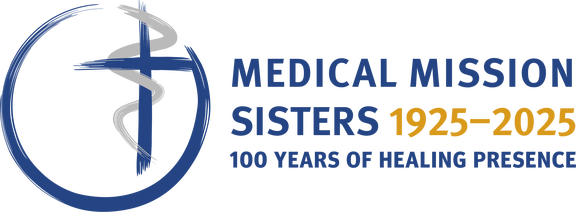An Honorary Award is Given in Frankfurt, Germany, and MMS-led Research Findings Are Published
Medical Mission Sisters in Germany, Frankfurt, have been working for decades in the Elisabeth-Straßenambulanz (ESA), Caritasverband Frankfurt. The ESA outpatient clinic offers low-threshold medical care to people who are sick and experience homelessness in Frankfurt. Living on the streets, in collective housing, emergency shelters or residential homes represents a major health burden and is associated with a multitude of health problems.
Since its founding in 1993, for 30 years, Dr Sister Maria Goetzens has been the director of ESA, instrumental in shaping its continuous development and demonstrating, along with her team, her deep commitment to helping sick, homeless people.
In recognition of all that she, together with her team of employed and voluntary medical personnel, have achieved, Dr Sister Maria has been awarded the honorary plaque of the City of Frankfurt. Many members of the ESA team, Medical Mission Sisters and Associates, were present to celebrate this joyful event with her.
Research initiated by ESA has demonstrated that almost 40% of homeless persons were admitted to hospital at least once in the preceding year. Their restricted access to healthcare and the lower quality of care that is experienced by such population groups result in higher morbidity and mortality. Studies have shown earlier onset and more commonly occurring frailty in homeless people.
The medical care given by ESA can reduce or even cure pain and physical suffering at the individual level. However, the medical team within the establishment of care for homeless people also wants to bring about systemic change by contributing evidence on the health status of people, facing the many challenges of homelessness.
In 2022, through a research project led by Sister Carmen Speck MMS, a team member of the ESA, and others, 60 homeless individuals were screened for physical health. 22% of those screened were considered physically frail and 62% “prefrail” (mean: 1.7; ±1.1). The proportion of people with frailty in the overall German population is much lower than this - estimated at 2.6% frail, 38.8% "prefrail", even in a significantly older age group, that it to say, 65 -79 years of age.
However, the deficit-oriented view of frailty seemed too limited in view of the life situation of ESA’s cohort, which was the reason for initiating further research collaboration with the Frankfurt University of Applied Sciences. In this way, through the Faho Study (Faho being Frailty, Vulnerability, and Ability to act among homeless people in Frankfurt), the medical perspective can be supplemented by a social science perspective.
Sister Carmen reports that the results from both perspectives open up possibilities to explore the complex social exclusions of this particularly vulnerable group in society and reveal their manifold forms of ability to act. This group of people’s way of dealing with exclusion also shows the efforts required by them to participate in society despite their frailty. Last but not least, through the research findings, it becomes clear that this vulnerable group actively (inter-) acts and therefore must not be victimised.
As mentioned above, the high morbidity and mortality in this group can be interpreted as consequences of premature frailty. However, Sister Carmen explains that further studies are needed to verify this assumption, and results will follow in due course.
Findings from the first phase of research have been published by Deutsches Ärzteblatt International in October 2023 and can be viewed here:



